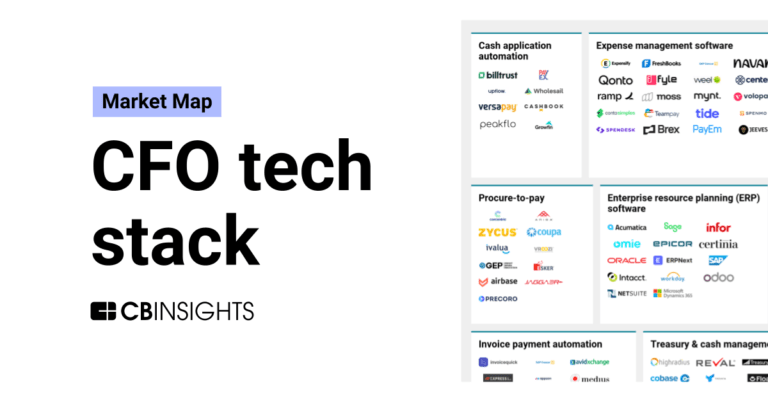
Certinia
Founded Year
2009Stage
Private Equity - II | AliveTotal Raised
$193.9MRevenue
$0000Mosaic Score The Mosaic Score is an algorithm that measures the overall financial health and market potential of private companies.
-91 points in the past 30 days
About Certinia
Certinia provides cloud-based professional services automation (PSA) and enterprise resource planning (ERP) software, focusing on the technology and services sectors. The company has a platform for managing service estimation, project delivery, resource management, financial planning, and customer success, integrated within the Salesforce ecosystem. Certinia was formerly known as FinancialForce. It was founded in 2009 and is based in Austin, Texas.
Loading...
ESPs containing Certinia
The ESP matrix leverages data and analyst insight to identify and rank leading companies in a given technology landscape.
The professional services automation (PSA) market provides integrated software platforms that help consulting firms, IT services companies, agencies, and other project-based businesses manage their complete service delivery lifecycle. PSA solutions combine project management, resource scheduling and optimization, time and expense tracking, project accounting, billing/invoicing, and analytics into …
Certinia named as Outperformer among 15 other companies, including Workday, SAP, and ServiceNow.
Loading...
Research containing Certinia
Get data-driven expert analysis from the CB Insights Intelligence Unit.
CB Insights Intelligence Analysts have mentioned Certinia in 1 CB Insights research brief, most recently on Oct 26, 2023.

Oct 26, 2023
The CFO tech stack market mapExpert Collections containing Certinia
Expert Collections are analyst-curated lists that highlight the companies you need to know in the most important technology spaces.
Certinia is included in 4 Expert Collections, including Fintech 100.
Fintech 100
248 items
250 of the most promising private companies applying a mix of software and technology to transform the financial services industry.
Tech IPO Pipeline
286 items
Fintech
9,806 items
Companies and startups in this collection provide technology to streamline, improve, and transform financial services, products, and operations for individuals and businesses.
Artificial Intelligence (AI)
10,412 items
Certinia Patents
Certinia has filed 61 patents.
The 3 most popular patent topics include:
- data management
- cloud platforms
- cloud computing

Application Date | Grant Date | Title | Related Topics | Status |
|---|---|---|---|---|
3/29/2022 | 2/18/2025 | Cloud computing, Cloud platforms, Cloud infrastructure, Cloud storage, Data management | Grant |
Application Date | 3/29/2022 |
|---|---|
Grant Date | 2/18/2025 |
Title | |
Related Topics | Cloud computing, Cloud platforms, Cloud infrastructure, Cloud storage, Data management |
Status | Grant |
Latest Certinia News
Oct 1, 2025
By Raju Malhotra Branded content with Certinia For decades, the core business model of professional services has been constrained by a simple, unchangeable fact – there are only so many experts and so many hours in a day. But the accelerating maturity of agentic AI has led to a paradigm shift, transforming how services are being sold, staffed, and delivered with the introduction of always-on, infinitely scalable digital labor. This once-futuristic vision is quickly becoming today’s reality. For Salesforce professionals at the heart of these organizations, understanding these kinds of shifts is key to leading the change. Let’s take a look at four of the biggest AI trends shaping professional services – and what you can do to prepare for the future. 1. The Shift from Resourcing People to Orchestrating Skills For years, staffing a project has been a scramble of spreadsheets, emails, and meetings. The core challenge is a multi-dimensional matching problem – finding the right person with the right skills, certifications, and availability, who is also in the right time zone and within the project’s budget. The future is a move away from this manual, person-centric model to a dynamic, skills-based approach. Instead of asking, “Who do we have?”, leaders will ask, “What skills do we need?”. An Agentforce-powered Staffing Agent can instantly analyze the requirements of a new project and map them against the detailed capabilities of the entire workforce. This allows firms to assemble the perfect team for every engagement, optimizing for the best possible outcome instead of just settling for who is available. 2. The Hybrid Human-Agent Workforce When people think of AI, they often think of replacement. But the reality in professional services will be augmentation. Think of the introduction of the tractor to farming. It didn’t replace the farmer; it took over the repetitive, manual labor, freeing the farmer to focus on higher-value work like crop strategy, smarter irrigation, and scaling the business. AI will do the same for professional services. A new hybrid workforce is emerging, where human experts are paired with AI agents or “digital specialists.” These agents will handle the modern equivalent of tilling the fields – project setup, data validation, budget creation, and other routine administrative tasks. This frees up your human experts to focus on what they do best: building client relationships, solving complex problems, and delivering strategic value. 3. AI Agents That Talk to Each Other The initial vision for AI in the enterprise often focuses on a single “digital specialist” assigned to a specific task. The real transformation, however, begins when these agents start collaborating with each other. The evolution of the hybrid workforce involves creating intelligent teams of AI agents that can manage complex, multi-step processes. For these agents to work together effectively, they need a shared language and a way to pass context from one to another. This is where standardization initiatives like Model Context Protocol (MCP) and Agent2Agent (A2A) become critical. Imagine a Staffing Agent that identifies a resource shortage for a project. Instead of just sending an alert, it hands off context – such as project scope, required skills, budget, and timeline – through MCP to a Finance Agent. The protocol ensures the Finance Agent interprets this request in a standardized way, models the cost of hiring a contractor, and appends financial parameters to the shared context. That enriched context is then securely passed to a Procurement Agent, which begins sourcing candidates who match both the required skills and budget constraints. In this flow, MCP is the connective tissue – it standardizes how agents communicate, governs what information is shared, and enforces boundaries so that a Finance Agent cannot, for example, trigger a procurement request to ramp up cloud AI infrastructure on its own. This combination of context-passing and governance is what transforms isolated digital specialists into coordinated, trustworthy teams of enterprise-grade agents. 4. The Rise of Autonomous Professional Services The three previous trends combine to form the essential ingredients for a fourth, transformative shift: the move from simple automation to fully autonomous services. This gives rise to Autonomous Professi onal Services , a new operational model where a PSA solution acts as a central orchestration engine, analyzing project goals and deploying a bespoke hybrid workforce of humans and AI agents to achieve them. This represents a fundamental shift from a model constrained by human supply to one amplified by digital scale. For the Salesforce ecosystem, this new model emerges from the combination of three core technologies: Unified Data for Context: A unified data fabric providing a single source of truth for every aspect of the customer relationship, giving the autonomous engine the complete context it needs to function. Salesforce Platform as the Foundation: The secure, trusted layer for deploying the AI agents that provide the digital labor, transforming AI from a concept into a tangible part of the resource pool. Salesforce-Native PSA as the Orchestration Brain: A solution like Certinia acts as the command center that defines the goals and rules for the AI agents, deploying them alongside human experts to optimize project outcomes from sale to delivery. Together, these layers create an intelligent control tower of hybrid labor for your services business. The business impact is massive; by overcoming human capacity limits, they can expand pipeline capture from a mere 10–20% to as high as 70–90%. This growth is also more profitable, with improved margins from offloading lower-value work to digital labor. Projects are completed faster, and crucially, client trust is maintained as human oversight remains embedded in every engagement to ensure quality and governance. Salesforce Is Every Services Business’s Cheat Code These four trends – orchestrating skills, building hybrid teams, enabling collaborative AI agents, and embracing autonomy – are all converging on the Salesforce platform to create a fundamentally new way to run a services business. The old model was a human capital problem: How many people can we hire, and can we find them fast enough? What happens when the perfect project lands, but the one person with the right skills is booked for the next six months? How do you keep your top talent from burning out while simultaneously turning away good business because the team is stretched thin? The new model is an orchestration problem, centered on a more sophisticated set of questions: How do we deploy the right blend of human and digital resources for every project? Which tasks require the personal touch of a human expert, and which can be handed off to a digital agent? How does the entire system learn from each engagement to make smarter, faster, and more profitable decisions tomorrow? For the Salesforce professionals who engineer the operational engine of the modern services business, the opportunity is immense. Your role is evolving from administering a system to architecting the future of autonomous service delivery. You are in a unique position to guide your organization through this shift, moving from a support function to the strategic center of the business. The era of Autonomous Professional Services has begun. The engine is being assembled on the Salesforce platform, powered by a native orchestration brain. The only question that remains is who will be the first to turn it on. Final Thoughts To get a deeper look at the analytical framework behind this visionary shift, download the new paper co-written by Certinia and Constellation Research, “ Unlocking a Trillion Dollar Opportunity for Professional Services with Autonomous PSA .” The Author Raju Malhotra Raju is the Chief Product and Technology Officer at Certinia , serving over two million users across 1,450 enterprises.
Certinia Frequently Asked Questions (FAQ)
When was Certinia founded?
Certinia was founded in 2009.
Where is Certinia's headquarters?
Certinia's headquarters is located at 301 Congress Avenue, Austin.
What is Certinia's latest funding round?
Certinia's latest funding round is Private Equity - II.
How much did Certinia raise?
Certinia raised a total of $193.9M.
Who are the investors of Certinia?
Investors of Certinia include TA Associates, Haveli Investments, General Atlantic, Salesforce Ventures, Technology Crossover Ventures and 5 more.
Who are Certinia's competitors?
Competitors of Certinia include Acumatica, ECI Software Solutions, WorkRails, Baton, Servicely and 7 more.
Loading...
Compare Certinia to Competitors

Acumatica provides cloud-based Enterprise Resource Planning (ERP) solutions, focusing on business management across various sectors. The company's offerings include financial management, construction, distribution, manufacturing, professional services, and retail management systems. Acumatica serves small to medium-sized companies across multiple industries with functionality tailored to specific sectors and a licensing model designed for customers. It was founded in 2008 and is based in Bellevue, Washington.

ECI Software Solutions provides cloud-based business management software for various industries. The company offers ERP solutions for manufacturing, distribution, building and construction, and field service sectors. ECI's software solutions include manufacturing execution systems, advanced planning and scheduling, payment processing, and customer relationship management tools, designed for small and medium-sized businesses. It was founded in 1999 and is based in Roanoke, Texas.

Odoo provides open-source business applications, focusing on integrated solutions for various business needs. It offers a range of services, including customer relationship management (CRM), e-commerce, accounting, inventory management, point of sale, and project management, all designed to work seamlessly together. Its products are primarily utilized by the enterprise resource planning (ERP) software industry. Odoo was formerly known as OpenERP. It was founded in 2005 and is based in Grand-Rosiere, Belgium.
Whoz is a cloud solution that connects talents to business opportunities within the Professional Services Organizations (PSOs) sector. The company provides a platform for skills mapping, talent management, project portfolio management, and performance analysis for talent deployment on projects. Whoz serves digital services companies, consulting firms, and engineering companies. It was founded in 2016 and is based in Paris, France.

PickYourSkills provides staffing management and resource optimization within the service industry. The company has a SaaS platform that supports project planning, performance tracking, and skills development for teams. Its solutions are for consulting firms, digital service companies, auditing, assurance, and accounting departments, as well as project-mode organizations. It was founded in 2018 and is based in Paris, France.
Prismforce is a company specializing in vertical SaaS solutions for the tech services industry, focusing on building a digital-first, agile talent supply chain. The company offers a suite of AI-powered software products designed to manage skills, create talent marketplaces, and forecast project staffing needs, all aimed at enhancing employee engagement and accelerating profitable growth for tech businesses. Prismforce primarily serves the technology services sector, providing tools that facilitate efficient project delivery and career development for tech professionals. It was founded in 2021 and is based in San Francisco, California.
Loading...
